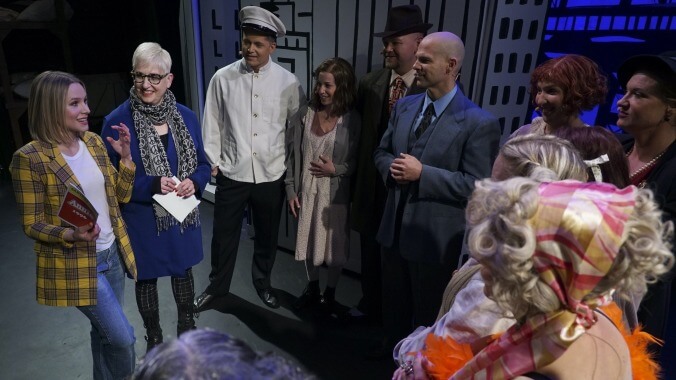On drama-club reunion show Encore, the play is not the thing

The attraction of Encore is not what Disney+’s drama-club reunion series is selling. When a now-grown actor revisiting their high-school production of Annie wonders aloud if this version is going to be as good as the one they did in 1996, Encore blows past the fact that, in all likelihood, the play probably wasn’t very good to begin with. With rare, performing-arts-school exceptions, all-kid performances of musical-theater chestnuts are not great entertainment—let alone slapdash revivals of those extracurricular productions mounted a decade-plus after the fact. To even put such a thing on television is ignoring another inconvenient truth: All apologies to doting parents, devoted faculty advisors, and the local business owners whose ads paid for the programs, but you’re not the audience for high-school theater. That’d be the young people on stage and in the wings, booth, and orchestra pits, who’ve spent untold hours pulling together to create something that, like adolescence itself, shouldn’t be captured for posterity.
Fortunately for Encore, someone involved with the Kristen Bell-hosted series recognized that the play, in fact, is not the thing. The sweat and energy expended in the weeks and months leading up to a performance, the bonding rituals that occur on stage and off, are what linger in the memory long after the final bow—and that’s where the heart of the show is. During the performance segment of the premiere episode, there’s a refrain about how quickly Annie seems to be flying by. The fleeting nature of Encore’s climactic performances could strike some viewers as insignificant, but for the International Thespian Society members (re)living vicariously through the people on screen, it should feel just right.
With Disney+ launching today, November 12, all eyes are on The Mandalorian. (All eyes that aren’t just re-watching Frozen, that is—or a spinning loading animation.) But Encore is the early epitome of the streaming service’s original programming strategy. The two episodes screened for critics—the second reviving a 2007 production of Beauty And The Beast in Saginaw, Texas—are wholesome and heartwarming, in the when-you-wish-upon-a-star tradition of not only the streaming service’s parent company, but also the thread of reality TV history that runs from This Is Your Life and Queen For A Day to Extreme Home Makeover and the new Queer Eye. Walking these former theater kids down memory lane stirs up strong emotions: Glory-days nostalgia, but also intense, adolescent feelings some of the participants might have thought they’ve left in the past. That these were adolescents who spent their free time burying their noses in the Ashman-Menken songbook only ups the intensity.
But the series’ probing of those feelings is shallow—an hour-long depiction of a stage musical getting back on its feet over the course of five days doesn’t have much room for delving. And so there are shortcutted check-ins, like those between two Saginaw alums and the director who served as a surrogate parent, dispensed with in a pair of brief, transparently orchestrated heart-to-hearts. Or there’s the telegraphing that occurs in the premiere episode with Jeremy, the homecoming king turned deputy sheriff who whinges over having to shave his head to play Daddy Warbucks. The less-than-charitable edit he receives emphasizes things he didn’t do—audition for Annie, dance at his own wedding—but it’s the recurring mentions of all the things oncologists told a young Jeremy he couldn’t do that lay out his aversion to the razor long before he’s shedding tears over it. (“Like a girl,” he says on the phone with his wife, before raising a kneejerk “no offense” that even David Brent would recognize as a little too practiced.)
This is another of Encore’s encapsulations of the drama-club experience: Whether you’re talking about high-school theater or reality television, big personalities tend to dominate a cast. And on that count, there’s a distinct difference between the premiere—with its middle-aged stars who work in law enforcement, classrooms, and a warehouse—and the episode that follows. That one opens with its erstwhile Mrs. Potts in a recording session for an unhinged children’s song about dairy products, then tosses to Saginaw’s Gaston, who earns his living as a mentalist. The logic follows that the closer Encore’s subjects are to their graduation year, the likelier they are to still be in engaged in creative pursuits and/or still capable of carrying a tune. But also: The less distance between then and now, the rawer the emotions, the sharper the memories of the people they used to be. Were it not for the evidence of a shared history on display, the adults playing kids in Annie may as well be strangers, and that lets some of the air out of Encore’s intriguing setup.
The rubbernecking that setup promises is in full effect, though—all warmth be damned. Things will go wrong: Cues will be missed, lines will be flubbed, the edge of the stage will not be marked clearly. There’s enough professional support behind the scenes and in the ensemble that nobody embarrasses themselves, but Encore doesn’t gloss over any of the mistakes that are inevitable when such a massive undertaking comes together over the span of a workweek.
Such unavoidable shagginess is Encore’s inherent charm, a literal let’s-put-on-a-show spirit that compensates for the hurried emotional beats and superficial character studies. The stakes are low—if not for the presence of cameras, there’d be no stakes at all—but they are personal. That’s the pull of Encore, what makes it worth rooting for these people whether they’re whining about a haircut, straining to find the “want” in an “I want” song, or struggling to keep their pants up during “Be Our Guest.” The encore part of Encore is almost incidental—the actual show is taking place offstage.